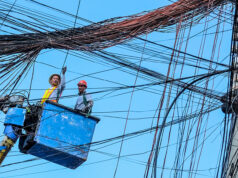THE government’s unconditional cash transfer program for farmers will focus on those “most affected” by the Rice Tariffication Law, with the assistance funded by excess collection from rice tariffs, the Department of Finance (DoF) said.
Finance Secretary Carlos G. Dominguez III told reporters late Wednesday that the Department of Agriculture (DA) will compile a list of areas where farmers have been hardest-hit by tariffication, which has liberalized rice imports and weakened the prices they can obtain for their crops.
Agriculture Secretary William D. Dar said that the program Mr. Dominguez is referring to is the P5,000 one-time cash assistance program announced last week.
Mr. Dar has said that the cash assistance will require P3 billion. The Rice Tariffication Law imposes tariffs on imported rice — typically 35% for Southeast Asian grain — and the collections support the Rice Competitiveness Enhancement Fund for six years at P10 billion a year. The cash transfer funds will be taken from excess over P10 billion, or after the government meets its RCEF funding obligations.
Mr. Dominguez said that the DA will determine the “most affected farmers” as “not all farmers in the Philippines were affected in the same way.”
“They’re still determining who are the most affected farmers and determining how much they will provide assistance to them. And quite frankly, not all farmers in the Philippines were affected in the same way… The idea is to have those most affected farmers and we will have the budget for it because we are going to be collecting more (from rice tariffs),” he told reporters after the members of the Cabinet’s economic development cluster met Wednesday.
He said that a governor from Central Visayas “assured” him that farmgate palay prices there “have not dropped,” while prices in Mindanao “seem to be holding up.”
The presence of large volumes of rice imports has rendered traders reluctant to offer competitive prices to domestic farmers, with the farmgate price for palay, or unmilled rice, reportedly in the single digits in some provinces, well below the P19 per kilo support price offered by the National Food Authority.
The government has collected P15 billion since March from rice tariffs, Bangko Sentral ng Pilipinas (BSP) Monetary Board Member Bruce J. Tolentino said at a briefing on Monday.
Asked about the aborted investigation into possible safeguard duties to protect farmers from imports, Mr. Dominguez said Mr. Dar did not bring up the issue during the cluster meeting.
“Apparently they don’t have confidence in pushing this idea and maybe they don’t have all the numbers to their satisfaction. So, we didn’t discuss it today,” he said.
“Decision-making has to be data-driven. I’m sure the DA is looking at the data so we’ll certainly listen to them, if and when they bring it back,” he added. — Beatrice M. Laforga



